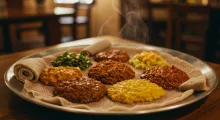Introduction
Across West Africa, food and drink are more than nourishment – they are a celebration of culture, heritage, and communal life. Among the many traditional beverages that grace local households, ceremonies, and street corners, ginger drink stands out as a beloved favorite. Known for its spicy kick, refreshing taste, and health-boosting properties, ginger drink is a staple in both Nigeria and Ghana.
Unlike carbonated sodas or artificially sweetened juices, ginger drink embodies simplicity and authenticity. Made from fresh ginger roots blended with water, lightly sweetened with sugar or honey, and sometimes enhanced with citrus or pineapple juice, this beverage represents a perfect balance of bold flavor and natural goodness. It is served chilled at parties, weddings, and family gatherings, and equally enjoyed at home as a thirst-quencher on a hot afternoon.
The appeal of ginger drink lies in its versatility. It is both a traditional and modern beverage, enjoyed by children and adults alike. Some versions lean heavily on spiciness, delivering a fiery burst of ginger heat, while others incorporate fruits for a milder, sweeter profile. Beyond taste, ginger drink carries medicinal value, celebrated for aiding digestion, boosting immunity, and offering relief from colds or nausea.
In Nigeria and Ghana, this beverage is more than just a refreshment – it is an emblem of hospitality. Serving ginger drink to guests demonstrates warmth, care, and pride in cultural roots. Today, it has also gained international recognition, often featured in Afro-fusion restaurants and even bottled commercially for export.
In this article, we will explore the origins of ginger drink in Nigeria and Ghana, its cultural significance, its health benefits, and a step-by-step recipe to make this zesty and energizing beverage at home.
Origins and Cultural Significance
Ginger (Zingiber officinale) is not native to Africa but was introduced centuries ago through trade routes connecting Asia, the Middle East, and Africa. West Africa’s tropical climate made it an ideal place for ginger cultivation, and over time, the root became widely integrated into local cuisines, medicines, and drinks.
In Nigeria, ginger drink is often served during celebrations such as weddings, naming ceremonies, and festive gatherings. It is also a common household refreshment during hot weather, as the spiciness paired with cold water or ice creates a deeply satisfying cooling effect. Street vendors and small-scale producers bottle ginger drink and sell it at markets, providing a readily available and affordable beverage option.
In Ghana, ginger drink holds a similar place of honor. Known locally as "ginger juice" or simply "ginger drink," it is a must-have at traditional events and family occasions. Many Ghanaians cherish the practice of preparing the drink at home with freshly ground ginger, ensuring that the flavor is strong and authentic. Pineapple juice or lemon juice is often added to Ghanaian versions, lending a sweet-tangy dimension to balance the spiciness.
Both countries view ginger drink not just as a casual beverage but as an important cultural marker. It symbolizes unity and togetherness, often consumed in communal settings where family and friends gather. Its preparation, passed down through generations, is a reminder of how African communities preserve and adapt food traditions over time.
Health Benefits of Ginger Drink
Aside from its bold and invigorating taste, ginger drink is prized for its health benefits. Ginger root has been used in herbal medicine for centuries and remains one of the most versatile natural remedies. Here are some key benefits:
- Aids Digestion – Ginger stimulates digestive enzymes and can help ease bloating, indigestion, and nausea.
- Boosts Immunity – Rich in antioxidants and anti-inflammatory compounds, ginger strengthens the immune system and helps the body fight infections.
- Relieves Cold and Flu Symptoms – The warming properties of ginger can soothe sore throats, clear nasal congestion, and reduce coughing.
- Improves Circulation – Ginger enhances blood flow, which contributes to overall cardiovascular health.
- Natural Energy Booster – The spicy kick of ginger provides a stimulating effect, making it a refreshing alternative to caffeinated drinks.
- Anti-Inflammatory Properties – Regular consumption of ginger may help reduce inflammation and joint pain.
With these benefits, ginger drink is often considered more than a refreshment – it is a natural tonic for overall wellness.
Recipe: How to Make Ginger Drink at Home
Ingredients:
- Fresh ginger root – 1 to 2 cups (depending on desired strength)
- Water – 6 to 8 cups
- Sugar or honey – ½ to 1 cup (adjust to taste)
- Lemon or lime juice – 2 tablespoons (optional)
- Pineapple juice – 1 cup (optional, for added sweetness and flavor)
- Cloves – 4 to 6 pieces (optional, for extra warmth and aroma)
- Ice cubes – for serving
Method:
- Wash and Peel the Ginger
- Rinse the ginger root thoroughly under running water to remove dirt.
- Peel the skin lightly with a spoon or knife.
- Grind or Blend the Ginger
- Chop the ginger into small pieces.
- Blend with 2–3 cups of water until smooth.
- Extract the Juice
- Strain the blended mixture using a fine sieve or cheesecloth.
- Press or squeeze thoroughly to extract all the juice.
- Add More Water
- Pour in the remaining water to dilute the concentrated ginger juice to your preferred strength.
- Flavor the Drink
- Stir in sugar or honey until dissolved.
- Add lemon juice for tartness or pineapple juice for natural sweetness.
- If using cloves, boil them in a small amount of water and mix the infusion into the drink.
- Chill and Serve
- Refrigerate the ginger drink for at least 1 hour or serve immediately over ice cubes.
- Stir well before serving, as the ginger particles may settle at the bottom.
Serving Suggestions
- Serve chilled in tall glasses, garnished with lemon slices or mint leaves.
- Pair with spicy West African snacks like suya (grilled meat skewers) or puff puff (fried dough balls).
- Store in the refrigerator for up to 3 days for maximum freshness.
Variations
- Ginger-Pineapple Drink: Blend fresh pineapple chunks with ginger for a tropical twist.
- Herbal Ginger Drink: Add mint leaves, lemongrass, or hibiscus for added flavor and health benefits.
- Sugar-Free Version: Sweeten with dates or keep it plain for those who prefer a sharp, unsweetened taste.
Conclusion
Ginger drink is much more than a spicy non-alcoholic beverage – it is a taste of West African identity, hospitality, and natural wellness. In Nigeria and Ghana, its fiery zest and cooling refreshment make it a household staple, a party favorite, and a street-side delight. From its cultural role in communal gatherings to its reputation as a health-boosting tonic, ginger drink continues to embody the richness of African culinary traditions.
Making ginger drink at home is simple, affordable, and endlessly customizable. Whether you like it fiery and sharp, mellow and sweet, or fruity with a tropical twist, this drink remains one of the most refreshing ways to enjoy the vibrant flavors of West Africa.
So, the next time you crave something bold yet wholesome, skip the soda – blend up a glass of homemade ginger drink and savor a timeless African classic.
// Amazon affiliate shopping cart script (function () { const affiliateTag = "your-affiliate-tag"; // Replace with your actual Amazon affiliate tag const items = [ { asin: "B08N5WRWNW", quantity: 1 }, { asin: "B07FZ8S74R", quantity: 1 }, { asin: "B089KV4YYX", quantity: 1 }, { asin: "B08J5F3G18", quantity: 1 } ]; function createAmazonCartLink() { let cartUrl = "https://www.amazon.com/gp/aws/cart/add.html?"; cartUrl += `AssociateTag=${affiliateTag}`; items.forEach((item, index) => { cartUrl += `&ASIN.${index + 1}=${item.asin}&Quantity.${index + 1}=${item.quantity}`; }); return cartUrl; } function createCartButton() { const button = document.createElement("button"); button.innerText = "Add to Amazon Cart"; button.style.padding = "10px 20px"; button.style.fontSize = "16px"; button.style.backgroundColor = "#ff9900"; button.style.color = "#ffffff"; button.style.border = "none"; button.style.cursor = "pointer"; button.style.borderRadius = "5px"; button.onclick = function () { window.location.href = createAmazonCartLink(); }; document.body.appendChild(button); } document.addEventListener("DOMContentLoaded", createCartButton); })();


